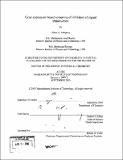| dc.contributor.advisor | Robert J. Silbey. | en_US |
| dc.contributor.author | Antipova, Alena A | en_US |
| dc.contributor.other | Massachusetts Institute of Technology. Dept. of Chemistry. | en_US |
| dc.date.accessioned | 2008-02-28T16:25:36Z | |
| dc.date.available | 2008-02-28T16:25:36Z | |
| dc.date.copyright | 2005 | en_US |
| dc.date.issued | 2006 | en_US |
| dc.identifier.uri | http://dspace.mit.edu/handle/1721.1/34500 | en_US |
| dc.identifier.uri | http://hdl.handle.net/1721.1/34500 | |
| dc.description | Thesis (Ph. D.)--Massachusetts Institute of Technology, Dept. of Chemistry, February 2006. | en_US |
| dc.description | Vita. | en_US |
| dc.description | Includes bibliographical references (leaves 75-89). | en_US |
| dc.description.abstract | Advances in our understanding of cellular function and signal transduction have resulted in ever increasing number of therapeutical targets and, consequently, underscored a demand for simple and universally applicable markers to monitor activity of the biological system. Gene expression-based screening is based on the assumption that introduction of a compound into biological system would affect directly or indirectly the gene expression, initiating an elaborate expression response to the disturbance of the system. In my thesis work I investigated new strategies to create a limited expression signature accurately representing the activation state of a biological system and to decrease redundancy in the complex expression pattern. To test the validity of our approach, I generated an expression signature for PDGF activation of ERK pathway in human fibroblasts and used this signature to screen a chemical compound library for an inhibitor of PDGFR/ERK pathway. As a result of the screen, I identified aurintricarboxylic acid, ATA, as a new inhibitor of PDGF receptor. The success of this study suggests that endogenous mRNA expression signature is an effective tool to monitor activation state of a cell signaling pathway and can be broadly used to identify compounds modulating condition of a biological system. | en_US |
| dc.description.statementofresponsibility | by Alena A. Antipova. | en_US |
| dc.format.extent | 90 leaves | en_US |
| dc.language.iso | eng | en_US |
| dc.publisher | Massachusetts Institute of Technology | en_US |
| dc.rights | M.I.T. theses are protected by copyright. They may be viewed from this source for any purpose, but reproduction or distribution in any format is prohibited without written permission. See provided URL for inquiries about permission. | en_US |
| dc.rights.uri | http://dspace.mit.edu/handle/1721.1/34500 | en_US |
| dc.rights.uri | http://dspace.mit.edu/handle/1721.1/7582 | |
| dc.subject | Chemistry. | en_US |
| dc.title | Gene expression-based screening of inhibitors of signal transduction | en_US |
| dc.type | Thesis | en_US |
| dc.description.degree | Ph.D. | en_US |
| dc.contributor.department | Massachusetts Institute of Technology. Department of Chemistry | |
| dc.identifier.oclc | 70852208 | en_US |
